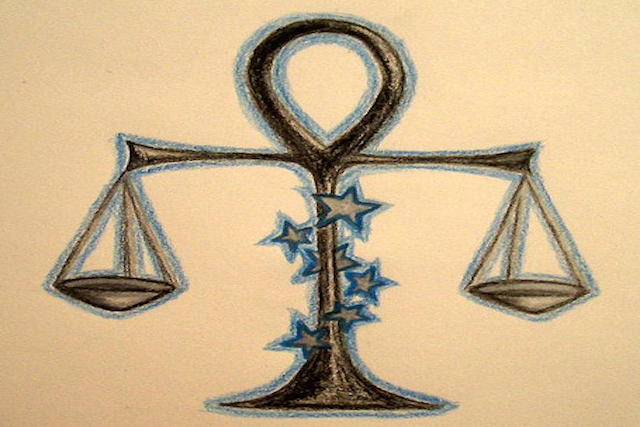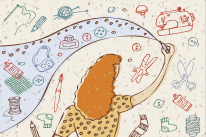
“Freedom is instantaneous the moment we accept things as they are.” ~Karen Maezen Miller
Seemingly for months now, upon learning anything new, my seven-year-old daughter has asked me, “Is it good or bad?”
Not brushing at night—good or bad? One hundred degree temperatures—good or bad? Water leak in the furnace—good or bad?
Some things are more obvious than others, but it’s the stuff in the middle that requires a more subtle explanation, especially as I go through life with the stress and anxiety of trying to both deal with uncertainty and figure out life in the “new normal” called chaos.
I wrestled with trying to make her understand that sometimes life is neither good nor bad—it just is.
But like any child trying to adjust the settings on her moral compass, she had difficulty in trying to understand that there can be some things that fall neither in the good nor the bad category.
Recently something happened that tested this notion and, in some strangely profound way, might have helped me find a way to explain life (as I understand it) to my seven-year-old.
My wife’s grandmother passed away.
Having been raised by her grandmother for most of her young life in India, my wife was distraught and sad. Although my daughter had very little contact with her great-grandmother, given the vast ocean that separated them, she could tell that her passing affected her mom deeply.
At first we didn’t know how to explain the passing to our chirpy and inquisitive child. So we didn’t, for a day. We avoided it. But then, as seven-year-olds do, she overheard me on the cell phone explaining to someone what had happened.
Almost instantly, a happy-go-lucky child became eerily quiet upon hearing that her mom’s grandmother died. She didn’t have to ask if it was good or bad. It was bad.
But is it?
Yes, of course it’s bad. It is terrible to lose someone you love. To miss them in your life. To miss their presence, their support, their encouragement, their love.
But it’s a fact of life. We all have to go at some point. While it’s not a “good” thing, you can’t get around it.
I tried to help my little one figure out her own feelings by explaining, “Babe, it’s sad that mom lost her grandmother. She will be missed because she brought so much love into our lives. But it’s neither bad nor is it good. It just is. Because that’s what happens in life.
“She was in her late eighties and had a tough life. It was her time, and some say it was good that she didn’t suffer so much more, and some say it was bad that she didn’t spend more time living. But we have to remember that this is something we cannot control, so it’s neither good nor bad. It’s just the way it is.”
While my daughter couldn’t fully explain her thoughts, I hope she understood what I was trying to say.
Having to explain this to her made me realize how important this lesson is for me as I learn to deal with the uncertainty of life, the uncertainty of a career, and the uncertain nature of all that is around me.
What I realized is that sometimes I put way too much emphasis on trying to figure out what is right and wrong.
What is the right path and what is the wrong path. What is good with the world and what is bad. What I like and what I don’t like. What someone thinks and what they don’t think.
With so much unpredictability in life and chaos at work these days in our uncertain world, what I have learned is that it really doesn’t matter. It really doesn’t matter if we label life as “good” or “bad.” It just is. It is the way it’s supposed to be.
All the overanalysis, overthinking, overplanning, overlabeling—all of that doesn’t accomplish anything. Putting a label on something doesn’t help me feel better!
In fact the opposite happens: You freeze and get stuck overthinking, trying to compartmentalize everything. You get overwhelmed by the chaos of life.
So much of our stress and anxiety come from our attempts to attach a “good” or a “bad” to the challenges we encounter in life. We believe things ought to be a certain way. We feel things in life should be generally “good.”
And when they aren’t, we feel really hurt. We feel disappointed. We feel burned. And we stop moving forward. We stop experiencing the full array of choices life has to offer during our journey.
Our reluctance to accept the fluid nature of life is at the center of so much of our paralysis.
I believe that, in order to deal with uncertainty and the chaotic up-and-down nature of life, we have to accept that life just is and embrace the chaos that we inevitably encounter.
Life is just the way it is supposed to be: unpredictable, good, bad, ugly, and great, all rolled up into one incredibly short experience.
As I tried to explain to my seven-year-old daughter and continue to remind myself in times like these, it isn’t really that important whether something is bad or good.
What’s really important is that life just is—and that we should stop worrying and get on with living it!
Photo by Cap’n Jo
About Bob Miglani
Bob Miglani writes about learning to move forward in uncertainty in life and work on his blog called http://www.EmbraceTheChaos.com. He works in New York City, helps his wife run her business, his parents run their Dairy Queen store and adores raising his two young daughters.













 Though I run this site, it is not mine. It's ours. It's not about me. It's about us. Your stories and your wisdom are just as meaningful as mine.
Though I run this site, it is not mine. It's ours. It's not about me. It's about us. Your stories and your wisdom are just as meaningful as mine.
Bravo!
The Power To Balance Our Thought and Our Life 🙂
Great post and very accurate in deed. Over-thinking, analyzation of situations and constnat worry never made tomorrow better.. It’s advisable to do your best in each given situation and sit back. More cannot be done 🙂 We are mere receivers of events in many cases..
Lina-exactly. I always like to think that no matter how hard I try, I cannot control the chaos ‘out there’, nor can I predict the future. The only thing I can control is myself and the chaos within.
Thank you for your comment!
I’m in a separation with my wife is this good or bad can we work things out of me bein a bad person to my wife I’ve been working very hard on getting my life better and
working on the problems I need to work on can I get a little advice what to continue doing to get my wife back in my life
Hopefully she got that lesson. And you’ll know if she did because I bet one day, something will happen and you’ll be upset and she’ll say something mindful and sweet like, “It isn’t good or bad, daddy. Don’t worry.” Because that’s what kids do. Remind us of the lessons we teach them when we have already forgotten them. 🙂
Actually…it’s funny you say that because she does exactly that…kind of my little other ‘self’ reminding me:). Great insight…’kids as our teachers’. Thank you for writing TB!
Well done – a great reminder. Thank you!
Bob thanks for this…loits of pearls in here but in particular: “Our reluctance to accept the fluid nature of life is at the center of so much of our paralysis.” Love that thought.
Jonathan – thank you very much for your nice words! All the best! -Bob
I really like this post, nice and simple, yet something we all have difficulty grasping at times. Great writing, thanks for sharing.
Hi Eleanor – thanks for the nice comments. I really appreciate it! All the best,
-Bob
I needed to read this today! Thanks for the great reminder.
this is such a great post! sharing it on my fb page littlehappybird !
Amitabha _ _
I love how you explained this to your seven year old. I also like how you reminded us that life is just life; all these labeling of things are just pointless. Looking forward to some more from you and this site.
This is very nice and a reminder to just slow down and enjoy life, not to rush and prejudge everything little thing.
I first learned this lesson myself a few years ago when I was going through a really rough time and read the book “Feeling Good” by David D. Burns. This was one of the concepts discussed in his book and it really changed my outlook. Since reading it, I really try not to label things (especially a “bad day” if something I don’t like happens)… I find it comforting to think that things just ARE, and it’s how I react to them that makes a difference.
I enjoyed this piece – thank you!
I love this article. I’ve been struggling with how to explain death to my son and you have given me some great ideas. I’ve pinned this article on my pinterest so I can refer to it in the future. Thanks!
While I agree with the point that much of life is neither good or bad, I couldn’t help feeling that you were straying into a complacent belief that because life ‘just is’, there is nothing you can do (or should do) to change it to make it better. Yes, much of life can’t be controlled but I don’t believe that that gives us the right to ignore the damage the human race is doing to the world and to one another, by saying ‘that’s just how it is’.
Actually it’s by liberating yourself and accepting things as they are that you find out what you can do to solve them. Only when in peace you can give your best contribution to the world.
Haha Tamara you best be takin notes from Pedro, kid
Thanks for this!
I think I finally get what Isness is! thanks.
Nice post, man. I really think this will help me stop over analyzing everything in a negative manner. Thanks for the input
I’d say that a way to think around this is that, the only correlation between “good” and “bad” would be that “good” would be perceived as better then “bad”. Whereas “bad” would be perceived as worse then “good”. My concept is that both “good” and “bad” are rough measurements in which events/items/people are determined to be better or worse, though to an certain extent anything at all could be better or worse. The fact is, the only correlations “good” or “bad” have is the correlations upon one or the other. Considering “good” and “bad” could potentially be put on to any scale, yet still make sense. Therefore we must judge things not by the measurement of “good” or “bad”, but by the properties of the event/item/person we are measuring. This way can we act upon the event/item/person effectively.
Great post. Thank you.
Wow nice! 🙂 This is exactly the way I think. However, is there an official name for this philosophy?? I’m having trouble finding a name for it. Before I looked this up I thought I was the only one that thought like this.. I was about to coin a term for it myself lol. I would’ve probably named it something stupid like “The Benemalovent Principle”. XD
☮☮☮☮☮☮
Ehh… maybe “The Benemalovent Idealogy”. Sounds more appropriate 🙂
☮☮☮
Life is awesome! It’s rarely bad, basically only has challenging moments (death, illness etc) but we are fortunate to be right here, right now!
The diversity of nature; our personalities, characters, integrity, instinct,
etc, should allow each of us to have our own interpretation of what is good or
bad. No one should be able to feel what her neighbor feels in similar
circumstances because nature is not redundant. Therefore, when similar
circumstances occur to two different parties and to say “I know how you
feel” in times of loss is a ridiculous sentiment. We are influenced
daily on how we should think, how we should dress, how we should act, and
what we should desire, and are saturated in our parental and cultural teachings. How do we know what good or bad really looks like? So, good or
bad is a measurement of events, and like morality, is based on opinion. Change is immanent in nature, and there are no flaws. I try to remember this
when life hands me notices of intent.
I enjoyed the article. Thank you for sharing.
“Freedom is instantaneous the moment we accept things as they are.” ~Karen Maezen Miller
I agree 100%
true. what i wasn’t able to admit to myself is all that youve said and more. thankyou for making me see my life as it really is. if its not bad then its good and if its not good then its bad–but does it really mean that? i was just trying to label everything and doing so is exhausting. thankyou for having said this.
I couldn’t dream up a nightmare worse than life itself.
Cool.
I’d be careful with teaching this kind of thinking to kids. By saying death and other tragedies aren’t good or bad, it might condition her to dismiss people’s feelings when they’re going through a hard time. It might even teach her to dismiss her own feelings. Kids need to be taught to deal with their emotions in a healthy way. An adult may benefit from this mindset of placid acceptance, but I don’t think it would be so great for a child, who might be more prone to dismiss or hold in their feelings if they’re taught that a bad event is “just the way things are.”
Would you feel the same if someone crossed a double yellow line on a highway and hit your car head on and killed your daughter? Have you ever experienced extreme violent trauma?
This is a fantastic topic and one that can have so many interpretations, one point I would like to make around decision making about what is “Good” and “Bad” We are influenced by many things in our short lifes, Parents, the media, teachers, friends and I think we take the pieces of life we want because they seem to fit the puzzle. Rightly or wrongly. We are influenced.
It’s only when we start to make mistakes in life do we learn and try to correct future mistakes by making better decisions.
I concur with Deborah Yates